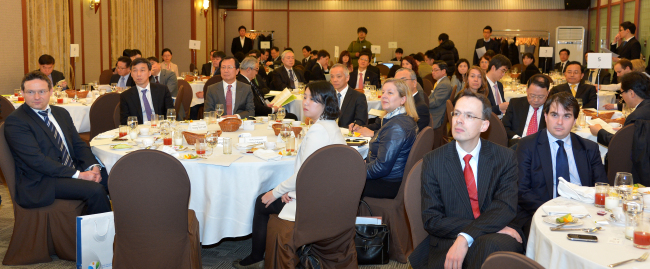Korea’s anticorruption body said on Wednesday it would establish an advanced anticorruption system and vowed to address the difficulties faced by foreign investors.
Anticorruption and Civil Rights Commission chairman Lee Sung-bo said the agency is looking to strengthen regulations against solicitation of public officials and tackling the system and practices that trigger corruption.
Speaking at the annual ACRC policy briefing for foreign business leaders, he said the Korean government is making multidimensional endeavors for a transparent government and society.
“The ACRC is committed to establishing an anticorruption system which exceeds the global standard,” Lee said.
 |
Lee Sung-bo, chairman of the Anticorruption and Civil Rights Commission, speaks at the seventh annual ACRC policy briefing for foreign business leaders on Wednesday in Seoul. (Yoon Byung-chan/The Korea Herald) |
 |
Officials from foreign companies with offices in South Korea attend the seventh annual policy briefing of the Anticorruption and Civil Rights Commission on Wednesday in Seoul. (Yoon Byung-chan/The Korea Herald) |
The session was attended by Thilo Halter, chairman of the European Chamber of Commerce in Korea; AMCHAM president Amy Jackson; Hirotsugu Ishiyama, chairman of the Seoul Japan Club; and heads of international companies investing in Korea.
As part of its plans to weed out corrupt officials, the ACRC said it would push for the enactment of the Bill on the Prevention of Illegal Solicitation and Conflict of Interest, which was proposed by former ACRC chief Kim Young-ran and is currently pending in the National Assembly.
The current Code of Conduct provides no guideline for punishing an act of solicitation by a public official unless it is related to his or her duty. The new bill, however, prohibits receiving or requesting payment of money or any item of value by a civil servant, regardless of whether the promise of a favor took place.
In addition, the existing Code of Conduct is only mandated for some parts of the government. Others such as members of the parliament are not required to follow it.
If the new bill is enacted, however, all public officials will be subject to the anticorruption regulations.
On top of working for the passage of the bill, the ACRC will monitor favoritism among civil servants, such as favoring an official’s family members in recruitment, overpaying for family occasions, and favoring family members or former public officials in during recruitment.
The commission will also keep an eye out for welfare fraud. Unqualified applicants of social benefits will be forced to pay punitive damage of up to five times the amount taken.
For the coming year, the commission will enhance the protection of whistle-blowers, whose role is important considering that cooperation from insiders is crucial for keeping thousands of public officials and millions of company workers in line.
To promote a corruption-free society, the ACRC will boost its partnership with the private sector as well. The Network for Corruption-free Society, consisting of 22 organizations, will take part in policy suggestions, collective campaigns and other activities.
Despite the anticorruption measures that kicked in after President Park Geun-hye took office, many expressed doubts about their effect. They pointed at Korea’s corruption perception index in 2013 by Transparency International, which dropped one notch from the year before to 46th in the world.
Lee, however, said the low CPI was because of the corruption scandals during the previous Lee Myung-bak administration and the pardons of political criminals.
“Because the index was made public in late 2013, people think the new administration’s policies had been reflected. But the data for the CPI was collected from 2011 to 2012,” he said. “Once our anticorruption measures are made into a law, (the CPI) will change drastically.”
By Yoon Min-sik (
minsikyoon@heraldcorp.com)







![[Herald Interview] 'Trump will use tariffs as first line of defense for American manufacturing'](http://res.heraldm.com/phpwas/restmb_idxmake.php?idx=644&simg=/content/image/2024/11/26/20241126050017_0.jpg)
![[Exclusive] Hyundai Mobis eyes closer ties with BYD](http://res.heraldm.com/phpwas/restmb_idxmake.php?idx=644&simg=/content/image/2024/11/25/20241125050044_0.jpg)
![[Herald Review] 'Gangnam B-Side' combines social realism with masterful suspense, performance](http://res.heraldm.com/phpwas/restmb_idxmake.php?idx=644&simg=/content/image/2024/11/25/20241125050072_0.jpg)